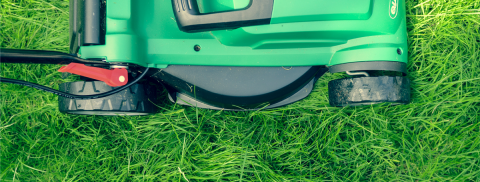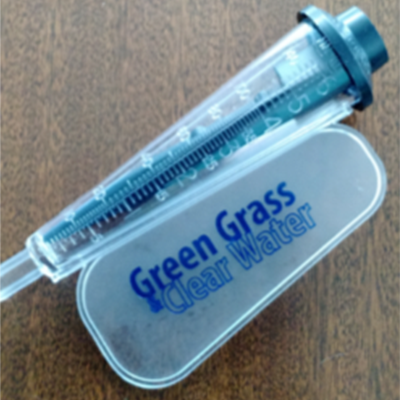Water Quality Friendly Lawn Practices While Sheltering At Home

Another spring is fast-approaching and we still find ourselves spending significant time at home during a pandemic. Fortunately, warmer weather will bring renewed opportunities to enjoy our outdoor spaces! Are you thinking about your lawn care or garden plans? Whether you are looking to get outside or engage your children in a project, this season is a great time to develop some new habits that will improve your green thumb, help protect the environment, and save money.
Whatever we do in our yards affects lakes, rivers, streams and bays downhill. By adopting a few simple practices, we can protect the health of water bodies we love while taking care of ourselves and the people around us by sheltering at home. These tips will help grow healthy lawns and protect water quality while we are spending more time at home.
Tip 1. Take caution with spring clean up
One of the first activities drawing us outside in the spring is tidying up the accumulation of twigs, pine needles, and decaying leaves left behind during the winter. As this plant material decomposes, it releases nutrients that plants need, so there’s no need to aim for immaculate, but important to let the sunlight through. The bulk of the raked-up yard waste should be put in an area where it can compost away from any drainage area or water body. Never rake yard waste into a stormdrain, down a river bank, or adjacent to any water body. Excess nutrients in a water body lead to algae blooms that rob aquatic and marine animals of oxygen, obscure water clarity, and even decrease adjacent property values.
Learn more about composting yard waste here: extension.unh.edu/resource/composting-home-gardener-fact-sheet
Other temptations in the spring include fertilizing too early and mowing too short. Different formulations of fertilizer require different minimum temperatures. Hold off on applying until you are sure your soil needs it and the soil temperature is adequate. Likewise, resist the temptation to mow too low. Encourage the early season grass roots to grow deeper into the soil by keeping more of the grass blade growing above ground.

Tip 2. Water wisely
Our lawns and gardens need about one inch of water per week, which is about the annual average amount of rainfall in northern New England (source: NOAA National Climatic Data Center). During dry spells, especially later in the summer, it may be necessary to water or irrigate to reach that amount. On the other hand, overwatering lawns and gardens wastes water and can cause nutrients needed by plants to run off the property or leach deep into the soil out of reach of plant roots. Place a rain gauge or empty bean or tuna can out in the yard and check it weekly to see if the rain has reached a one inch mark. Only water or irrigate when the rainfall drops below that one inch weekly average.
Learn more about watering wisely here: extension.unh.edu/blog/water-conservation-fundamentals-gardening-and-landscaping
Tip 3. Do a soil test
The University of New Hampshire's Soil Lab Testing is open! Soil test results provide important information about nutrient and mineral levels in our soil, characteristics of the soil, and recommendations for fertilizer. Without this information, we may end up applying products or using practices that waste time and money, inhibit plant growth, and contribute to pollution.
Watch a short video about how to take a soil sample and learn more about soil testing here: extension.unh.edu/tags/test-your-soil

Tip 4. Measure the dimensions of your yard
Whether you are interested in overseeding a lawn, adjusting the soil pH with lime, top dressing with compost, or applying fertilizer, you will need to know the dimensions of the lawn area in order to purchase and/or apply the correct amount of seed, lime, compost, or fertilizer. Overapplying compost or fertilizer, in particular, can create water quality problems in lakes, rivers, and bays downstream, so it’s very important to apply only what’s needed, if it’s needed.
Here’s a handy guide to measuring lawn dimensions and calibrating a spreader to make sure you are applying only what’s needed and no more: extension.unh.edu/resource/calculating-lawn-fertilizer-rates-fact-sheet
This is a perfect opportunity to adopt habits that we have put off because we didn’t have as much time at home. Enjoy the season of growth while keeping yourself and others safe!
Learn more tips for water quality friendly lawn care from our Green Grass and Clear Water flyer, here.
